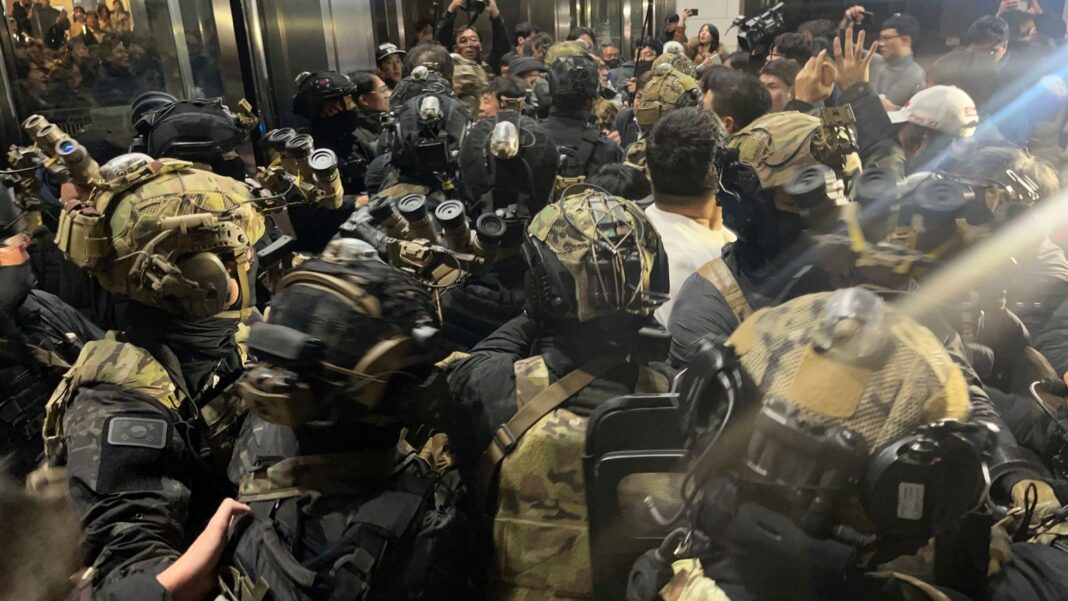Protesters are clashing with soldiers and police in South Korea’s capital after the country’s president Yoon Suk Yeol declared emergency martial law.
Amid chaotic scenes outside the nation’s parliament, MPs inside have voted to block the president’s declaration, with the speaker saying the law is now invalid.
But what is martial law, why did the president introduce it and why are people protesting?
What is martial law?
It enacts temporary rule by the military, and is usually invoked in times of war, rebellion or natural disaster.
When martial law is in effect, the military commander has unlimited authority to make and enforce laws.
Scenes outside parliament today. Pic: Reuters
It suspends all existing laws – meaning there can be a suspension of normal civil rights and the use of military law on the civilian population.
The step is taken when the civilian authorities are deemed unable to function.
The surprise move was the first declaration of martial law since the country’s democratisation in 1987, and it is unknown how long it could be in place for. It’s previous martial law was In October 1979.
Martial law is typically temporary, but it can continue indefinitely. It is most often declared in times of war and/or emergencies such as civil unrest and natural disasters.
Recent examples of martial law being enforced include in Ukraine following Russia’s full-scale invasion.
The martial law command in full
The following is South Korea’s martial law command document:
“To safeguard liberal democracy and protect the safety of the people against anti-state forces threatening to overthrow the Republic of Korea, the following measures are declared nationwide effective December 3, 2024, at 11:00 PM.
“1. All political activities, including the operations of the National Assembly, local councils, political parties, political associations, assemblies, and demonstrations, are strictly prohibited.
“2. Any act that denies or seeks to overthrow the liberal democratic system, including the dissemination of fake news, manipulation of public opinion, and false propaganda, is prohibited.
“3. All media and publications will be subject to the control of the Martial Law Command.
“4. Strikes, work slowdowns, and gatherings that incite social disorder are forbidden.
“5. All medical professionals, including resident doctors currently on strike or absent from medical duties, must return to their work and perform their responsibilities within 48 hours. Violators will be dealt with under martial law.
“6. Measures will be implemented to minimize inconvenience for ordinary citizens, except for anti-state forces and those attempting to overthrow the system.
“Violators of this proclamation will be subject to arrest, detention, and search and seizure without a warrant under Article 9 of the Martial Law Act (Special Measures by the Martial Law Commander) and punished under Article 14 of the Martial Law Act (Penalties).”
Why did the president introduce it?
In his announcement on Tuesday night, Yoon Suk Yeol said it was critical for defending the country’s constitutional order.
“I declare martial law to protect the free Republic of Korea from the threat of North Korean communist forces, to eradicate the despicable pro-North Korean anti-state forces that are plundering the freedom and happiness of our people, and to protect the free constitutional order,” Mr Yoon said.
The move comes after two years of Mr Yoon struggling to push his agendas through in an opposition-controlled parliament.

The president of South Korea delivering his statement. Pic: AP
His conservative People Power Party has been in a deadlock with the liberal Democratic Party over next year’s budget bill.
Ministers protested against the move on Monday by the Democratic Party to slash more than four trillion won (approximately £2.1bn) from the government’s budget proposal.
South Korea martial law: Follow live updates
Please use Chrome browser for a more accessible video player

6:58
Britain’s former ambassador to North Korea, John Everard, says he feels
Mr Yoon said that action undermines the essential functioning of government administration.
The president has also dismissed calls for independent investigations into scandals involving his wife and top officials, drawing criticism from his political rivals.
Security and defence analyst Professor Michael Clarke told Sky News he believes the introduction of martial law is therefore Mr Yoon’s attempt to thwart his political opponents.

South Korea’s main opposition Democratic Party’s staff set up a barricade to block soldiers. Pic: Reuters
“Yoon has been leading a minority government for some time, against him the Democratic Party have just frustrated whatever he has tried to do,” Clarke said.
“He has decided to get ahead of his opposition by creating this move.
“The last thing that liberal democracy needs at the moment is one of the democracies of Asia turning into a short term dictatorship, so I think this is only a short term parliamentary manoeuvre, but it may turn out to be more.”
What has the reaction been?
Opposition leader Lee Jae-myung has said the declaration of martial law was “unconstitutional” and called for the public to protest outside parliament.
He said parliament, which is controlled by his party, would try to nullify the martial law, but added he feared the military will try to arrest MPs.
According to the law in South Korea, the government must lift martial law if the majority of the National Assembly demands it in a vote.
Live TV footage from earlier today showed South Korean parliament aides pushing back martial law forces, spraying fire extinguishers while the public and police clashed.
Parliament has now voted to block the declaration, but it is unclear whether the president and military personnel will abide by the decision.
Before the vote, the leader of the president’s own People Power Party, Han Dong-hoon, vowed to defy him by saying the decision to impose martial law was “wrong”.
He pledged to “stop it with the people” and said the step was unconstitutional.







